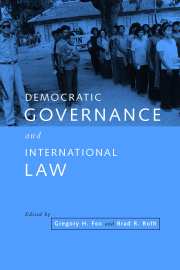Book contents
- Frontmatter
- Contents
- List of contributors
- List of acknowledgments
- Introduction: the spread of liberal democracy and its implications for international law
- PART I THE NORMATIVE FOUNDATIONS OF A RIGHT TO POLITICAL PARTICIPATION
- PART II DEMOCRACY AND INTER-STATE RELATIONS
- PART III DEMOCRACY AND THE USE OF FORCE
- 7 Sovereignty and human rights in contemporary international law
- 8 “You, the People”: pro-democratic intervention in international law
- 9 Pro-democratic intervention by invitation
- 10 The illegality of “pro-democratic” invasion pacts
- 11 International law and the “liberal peace”
- PART IV DEMOCRATIZATION AND CONFLICTING IMPERATIVES
- PART V CRITICAL APPROACHES
- Index
8 - “You, the People”: pro-democratic intervention in international law
Published online by Cambridge University Press: 04 May 2010
- Frontmatter
- Contents
- List of contributors
- List of acknowledgments
- Introduction: the spread of liberal democracy and its implications for international law
- PART I THE NORMATIVE FOUNDATIONS OF A RIGHT TO POLITICAL PARTICIPATION
- PART II DEMOCRACY AND INTER-STATE RELATIONS
- PART III DEMOCRACY AND THE USE OF FORCE
- 7 Sovereignty and human rights in contemporary international law
- 8 “You, the People”: pro-democratic intervention in international law
- 9 Pro-democratic intervention by invitation
- 10 The illegality of “pro-democratic” invasion pacts
- 11 International law and the “liberal peace”
- PART IV DEMOCRATIZATION AND CONFLICTING IMPERATIVES
- PART V CRITICAL APPROACHES
- Index
Summary
What difference does it make to the dead, the orphans and the homeless, whether the mad destruction is wrought under the name of totalitarianism or the holy name of liberty or democracy? I assert in all humility, but with all the strength at my command, that liberty and democracy become unholy when their hands are dyed red with innocent blood.
M. K. GandhiINTRODUCTION
There is now a considerable literature on “the emerging right to democratic governance,” arguing in essence that the democratic entitlements spelt out in human rights treaties are at last achieving more than hortatory status. For the greater part of the twentieth century, the relatively small number of actual democracies and uncertainty as to the precise content of such a right precluded general endorsement of a principle of democracy. Moreover, as James Crawford argues, the manner in which classical international law conceptualized sovereignty and the State was deeply undemocratic, or at least capable of operating in deeply undemocratic ways.
In the course of the 1980s, however, democracy came to assume far greater importance: the number of States legally committed to open, multiparty, secret-ballot elections with universal franchise grew from about one-third in the mid-1980s to as many as two-thirds in 1991; new discourses in international law and international relations stressing democracy as a value emerged; and the international community showed a greater willingness to encourage or apply pressure upon a State to hold or recognize the results of elections, or take part in election-monitoring.
- Type
- Chapter
- Information
- Democratic Governance and International Law , pp. 259 - 292Publisher: Cambridge University PressPrint publication year: 2000
- 8
- Cited by



